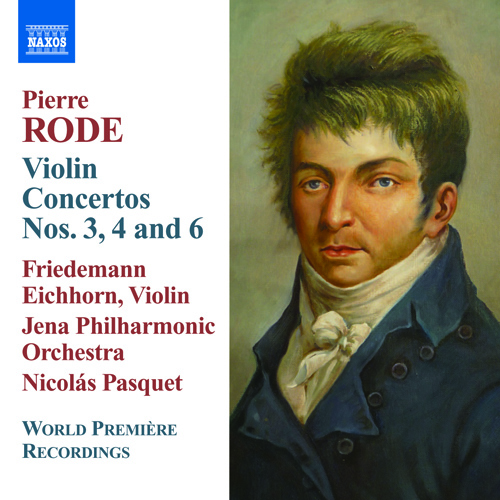RODE, P.: Violin Concertos Nos. 3, 4 and 6 (Eichhorn, Jena Philharmonic, Pasquet)
Pierre Rode was one of the giants of the violin world. He was a performer of superb technique—he premièred Beethoven’s last Violin Sonata in Vienna—and wrote a large amount of music for his instrument, most prominently 13 concertos. They exhibit the highest qualities of the French School: grace, lyricism, fleetness and fluency. The Third is grandiose and brilliant, the Fourth is tauter and gloriously agile, whilst the Sixth is one of his greatest, most famous and complete statements in the concerto form. The first release in this series, (Concertos Nos. 7, 10 and 13 / 8.570469), earned Friedemann Eichhorn the highest plaudits: “sweetness of phrasing…with the delicacy of a caress—while skirting the technical minefields as if they didn’t exist.” (Fanfare)
Tracklist
Jena Philharmonic Orchestra (Orchestra)
Pasquet, Nicolas (Conductor)
Jena Philharmonic Orchestra (Orchestra)
Pasquet, Nicolas (Conductor)
Jena Philharmonic Orchestra (Orchestra)
Pasquet, Nicolas (Conductor)
Jena Philharmonic Orchestra (Orchestra)
Pasquet, Nicolas (Conductor)
Jena Philharmonic Orchestra (Orchestra)
Pasquet, Nicolas (Conductor)
Jena Philharmonic Orchestra (Orchestra)
Pasquet, Nicolas (Conductor)
Jena Philharmonic Orchestra (Orchestra)
Pasquet, Nicolas (Conductor)
Jena Philharmonic Orchestra (Orchestra)
Pasquet, Nicolas (Conductor)
Jena Philharmonic Orchestra (Orchestra)
Pasquet, Nicolas (Conductor)
Jena Philharmonic Orchestra (Orchestra)
Pasquet, Nicolas (Conductor)
Jena Philharmonic Orchestra (Orchestra)
Pasquet, Nicolas (Conductor)
Jena Philharmonic Orchestra (Orchestra)
Pasquet, Nicolas (Conductor)

One of the most creative and versatile musicians of his generation, German-born Friedemann Eichhorn’s artistic activities range from performing early Baroque music on period instruments to classical and contemporary works with renowned orchestras and chamber music partners. Recent highlights include performances with the Hong Kong Philharmonic Orchestra under the baton of Christoph Eschenbach, and the Orchestra dell’Accademia Nazionale di Santa Cecilia under Sir Antonio Pappano. Among many other works, Friedemann Eichhorn rediscovered and first recorded the complete violin concertos of French virtuoso Pierre Rode. He has also given the world premieres of Fazıl Say’s Violin Concerto No. 2, Violin Sonata No. 2 and Tristan und Isolde transcriptions.
Eichhorn is a founding member of the Gropius Quartett and the Phaeton Piano Trio. He studied with Valery Gradow at the University of Music and Performing Arts Mannheim, with Alberto Lysy at the International Menuhin Music Academy and with Margaret Pardee at The Juilliard School, and earned a PhD in musicology from the University of Mainz. Eichhorn holds a violin professorship at the University of Music Franz Liszt Weimar and is artistic director of the Kronberg Academy. He plays the ‘ex-Huberman’ violin by Jean Baptiste Vuillaume from 1856.
The Jena Philharmonic Orchestra (JPO) is an integral part of the cultural life of Jena. The orchestra has collaborated with world renowned soloists and guest conductors, notably on the Mahler/Scartazzini cycle of complete symphonies. In addition to its concert season in Jena the JPO gives guest performances throughout Germany and Europe, and in 2018/19 toured China. The JPO boasts extensive outreach and education programmes, and promotes accessibility through special concert formats and unusual collaborations.
With a reputation for being a young, dynamic orchestra, it is one of the founders of the European orchestral network, ONE®. A unique feature of the JPO is its three affiliated choirs – the Philharmonic Choir, the Jena Madrigal Circle and the Boys’ Choir. In both 1999 and 2002, the orchestra was awarded ‘best concert programme of the season’ by the German music publishers association (DMV), and from 2017 to 2020 it received funding from the Federal Government (Bundesregierung) as part of the ‘Exzellente Orchesterlandschaft Deutschland’ initiative.


Nicolás Pasquet was born in Montevideo, Uruguay. He studied violin and orchestral conducting in Stuttgart and Nuremberg, and has won several national and international conducting competitions. From 1993 to 1996 Pasquet was chief conductor of the Pécs Symphony Orchestra, and was awarded the Béla Bartók/Ditta Pásztory and László Lajtha Foundation Prizes for his interpretations of Hungarian music. He also has served as chief conductor of the Neubrandenburger Philharmonie and the orchestra of the Coburg State Theatre. His discography includes numerous recordings for Marco Polo, Naxos and Beyer.
Pasquet has been professor for conducting at the University of Music Franz Liszt Weimar since 1994, where he teaches an international conducting class and is chief conductor of the symphony orchestra. Over the years, Pasquet has developed strong collaborative relationships with youth and student orchestras in Germany, Asia and Central America. He is currently chief conductor of the Youth Symphony Orchestra of the state of Hesse, Germany.

The name of Pierre Rode is familiar to all violinists, whose training involves the inevitable study of Rode’s concertos and studies. A pupil of Fauvel in his native Bordeaux, he went on to study with Viotti in Paris, giving the first performances of his teacher’s later concertos. Rode was appointed in 1796 to the staff of the newly established Conservatoire but was able to continue concert tours. In 1799 he was appointed solo violinist in Napoleon’s private musical establishment, and from 1804 spent four years at the Russian court in St Petersburg. In Vienna he performed, with Archduke Rudolph, Beethoven’s Violin Sonata in G major, Op. 96, the last movement of which was specially written for him. After teaching in Berlin (his pupils including Mendelssohn’s friend and collaborator Eduard Rietz) he finally returned to Bordeaux, only occasionally visiting Paris where he failed to resume his concert career.
Violin Music
Rode left 13 violin concertos, works often used now by ambitious students. His chamber music includes 24 Caprices en forme d’études and fantasies and variations for unaccompanied violin, duos for two violins, and quatuors brillants – quartets with a dominant role for the first violin. He collaborated with Kreutzer and Baillot in an influential Méthode de violon.
How to Play the Rode Caprices (courtesy of Strings Magazine)































